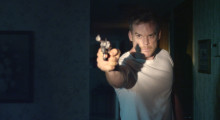Jim Mickle
-
Cold in July | Director Jim Mickle

Attention, our audience’s and our own — it’s a valued commodity these days. We struggle to command our audience’s attention, for them to discover our work and then, once they’ve discovered it, to actually focus on it. Meanwhile, we struggle to focus our own attention, to fight our society’s weapons of mass distraction so we can not just see our work to completion but fully discover the meanings within it. What role does attention play in your work? Can you discuss an instance where you thought about some aspect of attention when it came to your film? I remember hearing […]
by Filmmaker Staff on Jan 17, 2014 -
Strange Fruit: Jim Mickle on We Are What We Are

Jim Mickle, whose 2010 post-apocalyptic monster picture Stake Land launched him into the top tier of filmmakers making artfully rendered low-budget horror pictures, is back with a lyrically photographed, deeply felt family drama that also happens to be about people that eat other people. In his remake of Jorge Grau’s fabulous 2011 Mexican shocker/political satire/cannibalism-themed exercise in existential miserablism We Are What We Are, Mickle moves the action from a hideously corrupt Mexico City to the rainy forests of the rural Catskills. It opens with the sudden and distressing death of a mysteriously stricken woman, Emma Parker (Kassie DePaiva). Her family, […]
by Brandon Harris on Sep 27, 2013 -
U.S. Indies Strong in Directors’ Fortnight

Yesterday, David Lowery’s Ain’t Them Bodies Saints was the sole U.S. entry in Critics’ Week, playing in a special screening. However, in the Directors’ Fortnight lineup, there is a more healthy dose of U.S. filmmakers. Magic Magic, one of two films starring Michael Cera that New York-based Chilean director Sebastian Silva premiered at Sundance, makes the leap from Park City to the Croisette, as does Jim Mickle’s cannibal movie We Are What We Are, starring “25 New Face” Julia Garner. Jeremy Saulnier, maybe better known as a stalwart indie cinematographer, premieres his second feature, Blue Ruin, in the strand, while […]
by Nick Dawson on Apr 23, 2013 -
JIM MICKLE AND NICK D’AMICI, “STAKE LAND”

In so many ruined, dystopian futures, ravenous beings stalk the burned out countryside, praying on the flesh and/or blood of humans, while a small band of tough survivors, almost always including a grim professional killer, a protege and a young refugee, desperately try to escape this world overrun. This basic conceit resembles Jim Mickle’s somber, post-apocalyptic tone poem fashioned as a late night, grindhouse B movie, Stakeland, which proves altogether more satisfying than any of the recent cable and multiplex ready vampire narratives or dystopian dramas (The Road, Time of the Wolf, One Hundred Mornings or Children of Men). Despite […]
by Brandon Harris on Apr 20, 2011
